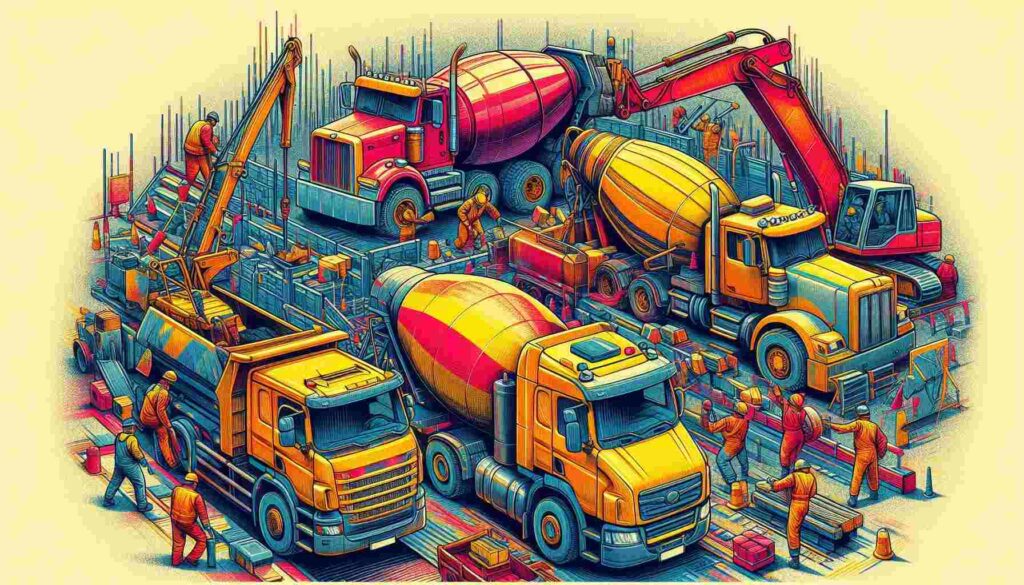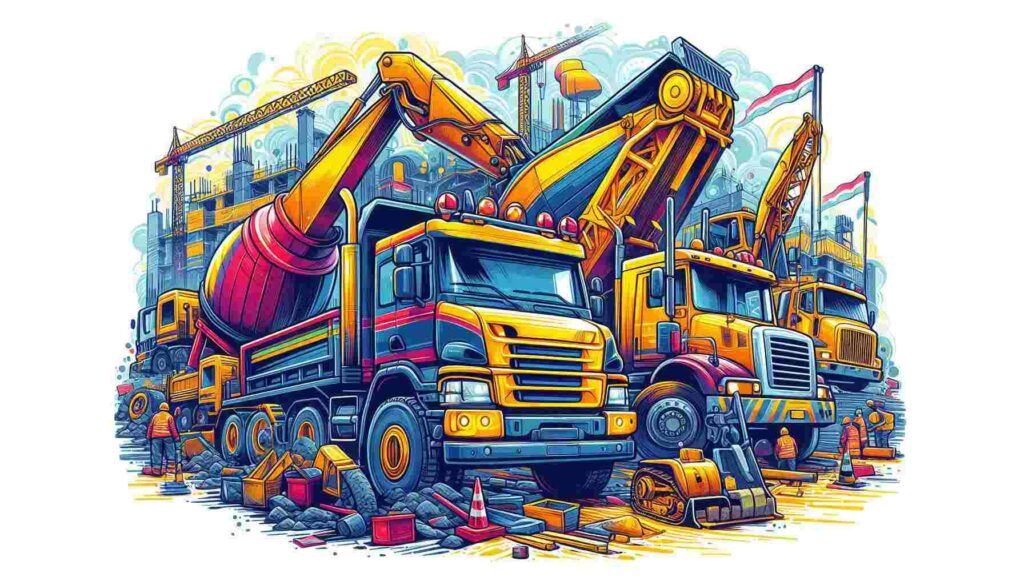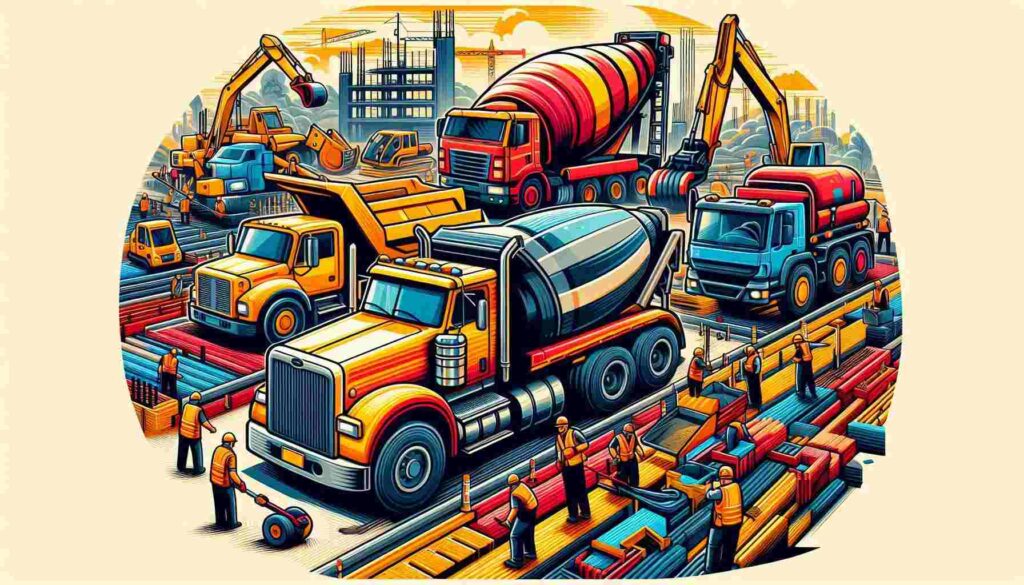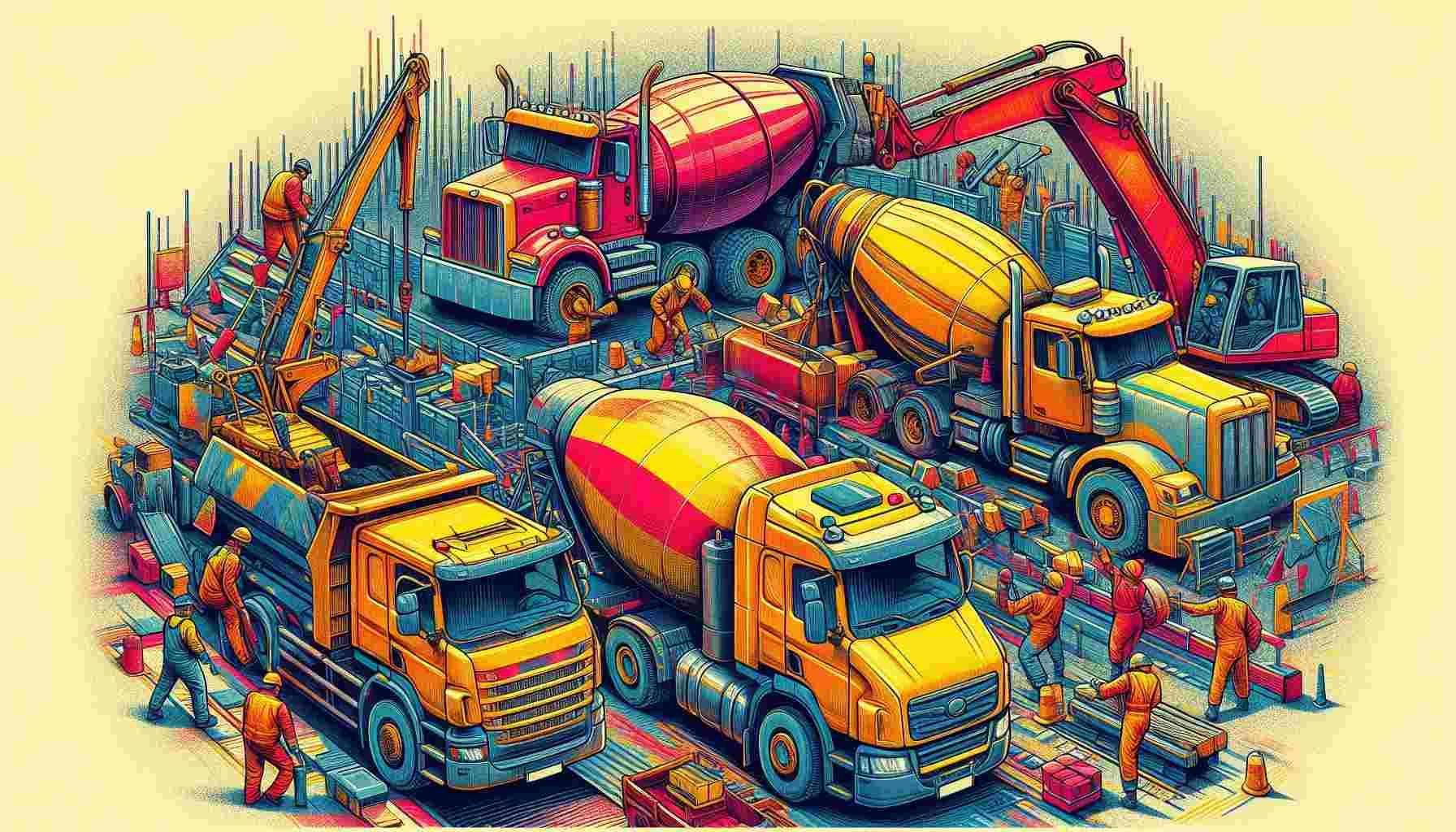You might ever seen a massive yellow behemoth rumbling down the street, its diesel engine roaring as it carries tons of material to a bustling construction site. That, my friends, is the awe-inspiring power of a construction truck in action. These incredible machines are the unsung heroes of the building world, transforming skylines and shaping our cities one project at a time.
Construction trucks are more than just big, noisy vehicles – they’re the backbone of the construction industry. Without these powerful workhorses, our modern world would look very different. From towering skyscrapers to sprawling highways, these machines play a crucial role in bringing architectural visions to life.
Key Takeaways
- Construction trucks are specialized vehicles designed for various tasks on building sites
- They come in many types, each with unique functions and capabilities
- These trucks are essential for efficiency and productivity in construction projects
- Proper operation and maintenance of construction trucks is crucial for safety and performance

Types of Construction Trucks: A Fleet of Giants
When it comes to construction trucks, there’s no one-size-fits-all solution. These powerful vehicles come in a wide variety of shapes and sizes, each designed to tackle specific tasks on the job site. Let’s take a closer look at some of the most common types of construction trucks you might encounter:
Dump Trucks: The Heavy Lifters
Ah, the classic dump truck – probably the first image that pops into your head when you think of construction vehicles. These bad boys are the workhorses of any construction site, capable of hauling massive loads of materials like dirt, gravel, and debris. With their distinctive tilting bed, dump trucks can quickly unload their cargo with the push of a button.
I remember watching in awe as a kid when a dump truck tipped its bed, sending a cascade of gravel thundering to the ground. It’s a sight that still amazes me to this day! Dump trucks come in various sizes, from nimble 10-wheelers to massive off-highway trucks that can carry over 400 tons of material in a single load.
Concrete Mixer Trucks: Mixing It Up
Ever seen those trucks with the big rotating drums? Those are concrete mixer trucks, and they’re absolutely essential for any project that requires, well, concrete. These trucks are like giant mobile blenders, keeping concrete mixed and ready to pour on the go.
Fun fact: the drum on a concrete mixer truck rotates in one direction to mix the concrete and the opposite direction to pour it out. It’s all about that perfect consistency! These trucks can typically carry between 8 to 14 cubic yards of concrete, which is enough to pour a decent-sized driveway or foundation.
Excavators: Digging Deep
While not technically trucks, excavators are too important to leave out of this list. These versatile machines are like the Swiss Army knives of construction sites, capable of digging, lifting, and even demolishing structures. With their long arms and powerful buckets, excavators can move earth with incredible precision and efficiency.
I’ve seen excavators do some pretty impressive things, from delicately removing tree stumps to tearing down entire buildings. The largest excavators in the world can weigh over 800 tons and have buckets big enough to scoop up 50 cubic meters of material in one go!
Bulldozers: Pushing the Limits
When you need to move a lot of earth or clear an area quickly, bulldozers are the go-to machines. These powerful trucks feature a large metal plate (called a blade) on the front, which they use to push soil, rubble, and other materials around the construction site.
Bulldozers are like the offensive linemen of the construction world – they may not be the flashiest players on the field, but they do the crucial groundwork that makes everything else possible. Some modern bulldozers even come equipped with GPS and laser guidance systems for ultra-precise grading and leveling.
Cranes: Reaching New Heights
When it comes to vertical construction, nothing beats a good crane. These towering machines are essential for building skyscrapers, bridges, and other tall structures. Mobile cranes mounted on trucks offer flexibility and can be easily moved from one site to another.
The sight of a crane operator skillfully maneuvering massive loads high above the ground never fails to impress me. Did you know that the tallest crane in the world can reach heights of over 800 feet? That’s taller than some skyscrapers!
The Importance of Construction Trucks in Modern Building Projects
Now that we’ve covered some of the main types of construction trucks, let’s talk about why these vehicles are so crucial to modern construction projects. It’s not just about their raw power – although that’s certainly a big part of it!
Efficiency and Productivity
Construction trucks dramatically increase the efficiency and productivity of building projects. Tasks that would take hundreds of workers days or weeks to complete can be accomplished in hours with the right equipment. For example, a single excavator can move more earth in a day than a team of 100 workers with shovels could manage in a week.
This increased efficiency doesn’t just save time – it also saves money. By reducing labor costs and speeding up project timelines, construction trucks help keep projects on budget and on schedule. In the fast-paced world of modern construction, that’s absolutely crucial.
Safety First
While construction sites can be dangerous places, the use of specialized trucks actually improves overall safety. These machines are designed to handle heavy loads and perform difficult tasks that would be extremely risky for human workers to attempt manually.
For instance, cranes allow workers to lift and place heavy materials without risking injury from overexertion. Dump trucks eliminate the need for workers to manually haul loads of debris, reducing the risk of back injuries and accidents. Of course, it’s essential that these machines are operated properly by trained professionals to maintain a safe work environment.
Versatility and Adaptability
One of the great things about modern construction trucks is their versatility. Many of these machines can be fitted with different attachments or modified to perform various tasks. This adaptability allows construction companies to tackle a wide range of projects with a relatively small fleet of vehicles.
For example, an excavator can be equipped with a variety of buckets for different digging tasks, a hydraulic hammer for breaking up concrete, or even a grapple for handling debris. This versatility not only saves money but also allows for greater flexibility on the job site.
As we’ve seen, construction trucks are far more than just big, impressive machines – they’re the lifeblood of modern construction projects. From moving mountains of earth to lifting massive steel beams into place, these powerful vehicles play a crucial role in shaping our built environment. But there’s still so much more to explore when it comes to these incredible machines. In the next section, we’ll dive deeper into the technology behind construction trucks and how they’re evolving to meet the challenges of 21st-century construction…

The Future of Construction Trucks: Embracing Technology
As we hurtle towards an increasingly digital future, construction trucks are keeping pace with some seriously cool tech upgrades. It’s not just about making these beasts bigger and stronger anymore – it’s about making them smarter, more efficient, and even eco-friendlier.
Autonomous Operation: The Rise of Robot Trucks
Believe it or not, self-driving trucks are already a reality on some construction sites. These autonomous vehicles use a combination of GPS, sensors, and artificial intelligence to navigate and perform tasks with minimal human intervention. While we’re not quite at the point of fully autonomous construction sites, the technology is advancing rapidly.
I recently visited a quarry where autonomous haul trucks were being tested, and it was like watching a carefully choreographed dance of giant machines. It’s pretty mind-blowing to see these massive trucks moving around and dumping their loads without a human in sight!
Electric and Hybrid Powertrains: Greening the Construction Industry
With increasing focus on reducing carbon emissions, many manufacturers are developing electric and hybrid construction trucks. These eco-friendly alternatives offer lower operating costs, reduced noise pollution, and zero on-site emissions. While battery technology still has some catching up to do for the heaviest applications, it’s making impressive strides.
I had the chance to test drive an electric compact excavator last year, and I was blown away by how quiet and smooth it was. Plus, no diesel fumes! It’s exciting to think about how these technologies will transform construction sites in the coming years.
Telematics and IoT: Connected Construction
Modern construction trucks are becoming increasingly connected, thanks to telematics and Internet of Things (IoT) technologies. These systems allow for real-time monitoring of vehicle performance, fuel efficiency, and maintenance needs. This data can be used to optimize fleet management, reduce downtime, and improve overall productivity.
For example, some dump trucks now come equipped with sensors that can detect payload weight and automatically adjust suspension and braking systems for optimal performance and safety. It’s like having a super-smart co-pilot watching over every aspect of the truck’s operation!

Maintaining the Beasts: Keeping Construction Trucks in Top Shape
With all this talk about high-tech features, it’s easy to forget that these machines still need good old-fashioned TLC to keep running smoothly. Proper maintenance is crucial for ensuring the longevity and performance of construction trucks.
Regular Inspections: The First Line of Defense
Daily walk-around inspections are a must for any construction truck operator. These quick checks can catch minor issues before they turn into major problems. Some key things to look out for include:
- Tire condition and pressure
- Fluid levels (oil, coolant, hydraulic fluid)
- Signs of leaks or damage
- Proper functioning of lights and safety equipment
I once heard a story about an operator who ignored a small hydraulic leak on his excavator. Long story short, it led to a catastrophic failure mid-job, costing the company thousands in repairs and lost productivity. Don’t be that guy!
Preventative Maintenance: Staying Ahead of the Game
Following a strict preventative maintenance schedule is key to keeping construction trucks running smoothly. This typically includes regular oil changes, filter replacements, and component inspections based on the manufacturer’s recommendations.
Many modern trucks come equipped with onboard diagnostic systems that can alert operators and fleet managers to potential issues before they cause breakdowns. It’s like having a doctor constantly monitoring your truck’s health!
Operator Training: The Human Factor
Even the best-maintained truck can be quickly ruined by an inexperienced or careless operator. Proper training is essential not just for safety, but also for maximizing the lifespan and performance of these expensive machines.
I’ve seen firsthand how a skilled operator can make a construction truck dance, performing tasks with precision and efficiency that would make your jaw drop. It’s truly an art form!
As we wrap up our journey through the world of construction trucks, it’s clear that these powerful machines are far more than just big hunks of metal. They’re marvels of engineering that continue to evolve and adapt to the changing needs of the construction industry. From the humble dump truck to the towering crane, each of these vehicles plays a crucial role in building the world around us.
The next time you pass by a construction site, take a moment to appreciate the fleet of trucks hard at work. They’re not just moving dirt and lifting materials – they’re shaping our cities, connecting our communities, and building the infrastructure that supports our modern way of life. Here’s to the mighty construction trucks and the skilled professionals who operate them – may they continue to push the boundaries of what’s possible in construction for years to come!
Frequently Asked Questions
1. What’s the biggest construction truck in the world?
The title of “biggest construction truck” often goes to the Caterpillar 797F, an off-highway mining truck. This beast weighs in at a whopping 1,375,000 pounds when fully loaded and can carry up to 400 tons of material. It’s so large that it’s usually assembled on-site! However, it’s worth noting that the “biggest” can depend on what metric you’re using – weight, carrying capacity, or physical dimensions.
2. How much does a typical construction truck cost?
The cost of construction trucks varies widely depending on the type, size, and features. A basic dump truck might cost anywhere from $100,000 to $250,000, while a large crane could set you back several million dollars. For example, a mid-sized excavator might cost around $200,000, while a concrete mixer truck could range from $150,000 to $200,000. Always remember, these are significant investments for construction companies!
3. Are there any women operating construction trucks?
Absolutely! While the construction industry has traditionally been male-dominated, more and more women are entering the field, including as heavy equipment operators. Organizations like the National Association of Women in Construction (NAWIC) are working to increase female representation in all areas of construction. It’s an exciting time for diversity in the industry, and women are proving they can operate these massive machines just as skillfully as their male counterparts.
4. How long does it take to learn to operate a construction truck?
The learning curve varies depending on the specific type of truck and the individual’s aptitude. Basic operation can often be learned in a few weeks, but becoming truly proficient can take months or even years of practice. Most operators start with smaller equipment and work their way up to larger, more complex machines. Many countries require operators to obtain specific licenses or certifications, which typically involve both classroom training and hands-on experience.
5. Are construction trucks bad for the environment?
Traditionally, construction trucks have contributed significantly to air pollution due to their diesel engines and high fuel consumption. However, the industry is making strides towards sustainability. Many newer models feature more efficient engines with reduced emissions, and as mentioned earlier, electric and hybrid options are becoming increasingly available. Additionally, proper maintenance and operation practices can help minimize environmental impact.
6. What’s the lifespan of a typical construction truck?
With proper maintenance, many construction trucks can last 10-15 years or even longer. Some types, like cranes, can remain in service for several decades if well-maintained. The lifespan largely depends on the type of truck, how it’s used, and how well it’s maintained. For example, a dump truck used in harsh mining conditions might have a shorter lifespan than one used for lighter urban construction work.
7. Can construction trucks drive on regular roads?
It depends on the type of truck. Many construction trucks, such as dump trucks and concrete mixers, are designed to be road-legal and can drive on public roads. However, larger equipment like excavators and bulldozers typically need to be transported on special trailers. Some countries have specific regulations about when and where construction vehicles can travel on public roads, often requiring special permits for oversized loads.
8. How do construction trucks handle different weather conditions?
Most construction trucks are designed to operate in a variety of weather conditions, but extreme weather can pose challenges. Many have enclosed, climate-controlled cabs to protect operators from heat, cold, and rain. Specialized tires or tracks help with traction in muddy or snowy conditions. However, safety considerations may limit operation in severe weather like high winds or heavy snow. Some projects in extreme climates use specially modified equipment to handle the conditions.
9. Are there any fully autonomous construction trucks in use today?
While fully autonomous construction trucks are not yet widespread, they are being tested and used in limited applications. For example, some mining operations use autonomous haul trucks to move materials. These systems are still being refined and face challenges in the complex, ever-changing environment of a typical construction site. However, many experts believe that autonomous or semi-autonomous construction equipment will become increasingly common in the coming years.
10. How do construction trucks impact urban development?
Construction trucks play a crucial role in urban development by enabling the construction of buildings, roads, and infrastructure. They allow for faster, more efficient construction, which can speed up urban growth and renewal projects. However, they can also present challenges in urban areas, such as noise pollution, traffic congestion, and potential damage to existing roads. Many cities have specific regulations governing the use of construction trucks to balance the needs of development with the quality of life for residents.






